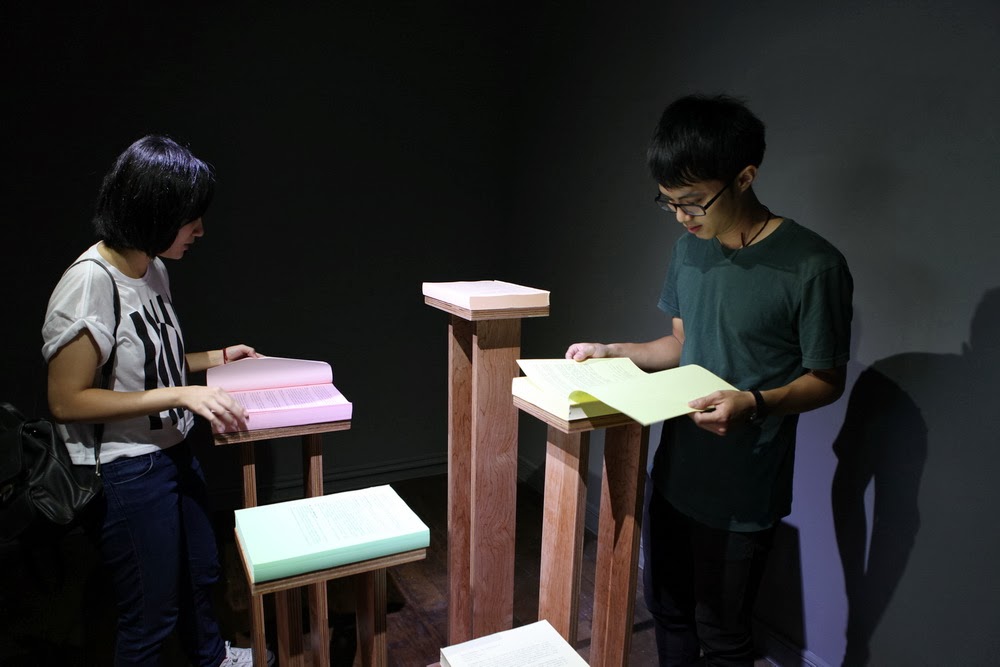The Revolutionary Road
single-channel video installation
28'57"
2013
展覽現場:影片播放實況
installation view in Chi-Wen Gallery:the showing
展覽現場文件裝置,內容為跟影片敘事有關的文章、新聞報導、網路媒體資料、美麗灣飯店大事紀等文字。一共有五個不同主題,分別被置放在高低不同的木架上,每個主題各自集結成獨立可單張撕取的資料,觀眾可自由帶走這些訊息。
installation view in Chi-Wen Gallery : The text installation was related to the video's narrative content but divided into five different themes. They were made into each sheet-tear separately information. People were free to take away these messages.
未竟之路 The Revolutionary Road from fanhsiaolan on Vimeo.
這部影片描述一個都市來的女子沿著東部海岸旅行,藉由所到景點的景致以及遇見的朋友,描繪出東部海岸的土地開發爭議。一件件越演越烈的土地開發案不但涉及環保問題、海灘權益、原住民傳統領域等議題,更呈現出臺灣長期以來地方政治經濟結構中政府單位、財團利益、黑道掛勾等之間的互競互利的依存關係,不斷惡性循環逐漸演變成深不見底複雜結構。在這樣的生存環境之中人們如何自處,如何面對未來,對現實的抗爭是否仍然存有一絲希望。
《破碎的海岸線:范曉嵐的〈未竟之路〉》
文/陳譽仁
本文原載於《藝術家》,2013年10月號,頁264-265。
《未竟的觀看之路:談范曉嵐的影像作用》
文/鄭文琦
本文原載於《典藏今藝術》no.253




----------------------------------------------------------------------------------------------------
Q:這次“類紀錄片”又帶點敘事性質的作品是第一次的嘗試嗎?為何選擇這樣的手法?
You have a new approach in making this
work, it’s more like a semi-documentary, yet with a clear narrative. Is this
your first attempt? Why choose this direction?
A:其實我並不想去為我的影像"分類",我只能說,這次拍攝的方式和以往有那麼一點不一樣,但又不是真的不一樣。老實說,我並不在乎它被稱為紀錄片、錄像、敘事影像或實驗電影...,事實上這些都有人稱呼過。對一個創作者來說,我認為這並不是最重要的,重要的是內容上能不能傳達出訊息,觀眾的反應與回饋是什麼...。
而選擇這樣的手法,是因為我想要串連許多可以眼見到的真實狀況,並加上自己認同的觀點。這跟我自己的社會性格、喜好以及創作脈絡有關,我喜歡旅行,加上我關心的事情容易傾向自然環境保護、土地正義、生存正義等這類的傾向。我也認同生存即是政治,一個人為了他的基本生存權利,必須關心他所在的社會結構以及自然環境,並具備一種隨時對抗不公的精神。然而事實上我們卻經常被許多不公平的事壓迫著,有些我們幾乎只能習以為常,但卻又常常被逼得不得不反抗。另一方面,我也認為人只是自然中的一部份,而不是地球的主宰,每個人都應該自持與謙卑地生存在地球上。
於是,我一直想在作品中揉合這些元素與性格上的僻好,並在現實環境的影像中,呈現生活在這個島上,理想狀態與實際狀況之間的壓抑精神狀態。
I actually don’t want to categorize my
works. I think it is slightly different, but not completely the same. Honestly,
I don’t mind people calling it a documentary, video, motion picture or
experimental film. I think it is more important for an artist that it delivers
the message as intended, and what counts is the audience feedback and response.
And from this new work, I want to bring out the truth and the reality, these
are the things that truly concern me. I think it has much to do with my own
social characteristics and my concept of the work. I like to travel, and I care
about
environmental protection, land justice,
living justice. I believe living is politics. A man should fight for his basic
right, care about the society he lives in and the environment, prepare and be
ready to fight against injustice. However, most of the time, we are suppressed
by unfairness and we just take it for granted or are forced to fight back
reluctantly. On the other hand, I think human
beings should co-exist with every creature on the planet, and we should be
humble and self-restricted.
Q:我們常在許多小說中看到故事主角設定從城市來到鄉間,城鄉間的差距帶出面對現實的逃離、現代化的反抗等等。這次作品妳從一位都市女子的眼中帶出整個影片內容,這樣的設定是否從我們熟悉的小說結構出發?主角的設定和妳自身是否為一種反射?
Q:我們常在許多小說中看到故事主角設定從城市來到鄉間,城鄉間的差距帶出面對現實的逃離、現代化的反抗等等。這次作品妳從一位都市女子的眼中帶出整個影片內容,這樣的設定是否從我們熟悉的小說結構出發?主角的設定和妳自身是否為一種反射?
We often find in the novels that a
protagonist from the urban city, travels to the countryside and exploits the
rebellion of modernism and escape from reality. In your work, we hear from the
entire story of a city woman, is this a reflection of yourself?
A:在敘事上我沒有特別設定類似小說的結構,如果有也是巧合罷了。但不可否認,角色的設定多少與我本身有點關係,我相信人的思想不太可能獨立單一的存在,一個人的觀點通常也意味著背後有某一種普常族群存在。因此當我想要表達自己的觀點時,我便經常使用女性角色,從他們的年齡或背景等條件,將他們引申為某一部分女性族群的化身,表達某一種可能存在的普遍性的觀點。
A:在敘事上我沒有特別設定類似小說的結構,如果有也是巧合罷了。但不可否認,角色的設定多少與我本身有點關係,我相信人的思想不太可能獨立單一的存在,一個人的觀點通常也意味著背後有某一種普常族群存在。因此當我想要表達自己的觀點時,我便經常使用女性角色,從他們的年齡或背景等條件,將他們引申為某一部分女性族群的化身,表達某一種可能存在的普遍性的觀點。
I don't have a specific plot set like a
novel; maybe it’s a coincidence. But the protagonist is part of me for sure. I
believe a person can’t exist alone in the universe, what’s in your mind usually
represents a group of people. Therefore, in most of my works, I use the female
character—with age and background—to embody many perspectives.
Q:多數妳的作品環繞著「自然」、「女性」、以及妳對土地正義的關注。從《不只是她》、《項鏈灣》、《聽他們說》到現在的《未竟之路》,妳覺得這一系列對自己在創作上有沒有什麼過程上的改變?《未竟之路》在這系列中扮演的角色是什麼?對妳自身而言是否也是一條「未竟之路」?
Q:多數妳的作品環繞著「自然」、「女性」、以及妳對土地正義的關注。從《不只是她》、《項鏈灣》、《聽他們說》到現在的《未竟之路》,妳覺得這一系列對自己在創作上有沒有什麼過程上的改變?《未竟之路》在這系列中扮演的角色是什麼?對妳自身而言是否也是一條「未竟之路」?
Many of your works have similar topics on “nature”, ”female” and
land justice. From your previous works of Makutaay-Not Only Her Story, The
Coast, What they Said to The Revolutionary
Road Revolutionary
Road
A:最大的改變是自己越來越清楚該以什麼姿態存在於這個世界上(笑)。從藝術學院的教育開始,創作總是容易環繞著藝術本質的探討。但我認為從現代之後藝術本質已然驟變,至今定義的區辨對我來說變得沒那麼重要。創作反而必須是更經驗式的,並且對應時代以及合乎生存的現實。也因此在我的身上可見藝術與生存的方式,以特殊的形式切割,一體兩面、互為表裡。換句話說,創作也是藝術家不斷地以作品對自己的生命進行辯證的過程,因此《未竟之路》帶給我的明確經驗,是讓我更確定的將作品當作行動的工具。
如果創作過程涉及我的生命政治,那作品難道不是呈現我的政治理念?A:最大的改變是自己越來越清楚該以什麼姿態存在於這個世界上(笑)。從藝術學院的教育開始,創作總是容易環繞著藝術本質的探討。但我認為從現代之後藝術本質已然驟變,至今定義的區辨對我來說變得沒那麼重要。創作反而必須是更經驗式的,並且對應時代以及合乎生存的現實。也因此在我的身上可見藝術與生存的方式,以特殊的形式切割,一體兩面、互為表裡。換句話說,創作也是藝術家不斷地以作品對自己的生命進行辯證的過程,因此《未竟之路》帶給我的明確經驗,是讓我更確定的將作品當作行動的工具。
The biggest change for me is I know better
in what position to live in this world. When I was in art school, making art
was about discovering the notion of art. But I feel the notion has changed, so
the definition is no longer vital to me. Creation should be established by
experience, and should be adapted to living reality. I am trying to combine
these two because I think by doing art; it’s a process for the artist to
reflect himself or herself. The Revolutionary
Road
If the process of making art involved my
politics of life, wouldn’t a piece of art represent my idea of politics as
well?
Q:妳的英文作品名稱為The Revolutionary Road,這來源是有什麼特別的根據嗎?美國作家Richard Yeats著名的小說Revolutionary Road便是透過一名女性來講述60年代美國社會人們對於改變的渴望和對生命空虛孤寂的吶喊。我覺得和影片中妳想表達的無奈有某種程度的聯結。
Q:妳的英文作品名稱為The Revolutionary Road,這來源是有什麼特別的根據嗎?美國作家Richard Yeats著名的小說Revolutionary Road便是透過一名女性來講述60年代美國社會人們對於改變的渴望和對生命空虛孤寂的吶喊。我覺得和影片中妳想表達的無奈有某種程度的聯結。
What is the reference of the work titled
The Revolutionary Road
A:我不否認我的作品總是具有女性主義脈絡的意涵,因為這不但沒什麼好否認,也無從否認,我想這多半也是基於我是個天生女性的關係。在依然父權的社會權力結構下,女性很容易有類似的成長經驗、身體經歷與社會遭遇(但其實更多的人並不自覺,或是察覺了卻將之合理化),自然而然地思想與信仰的某些片段,容易與女性主義的發展不謀而合。
A:我不否認我的作品總是具有女性主義脈絡的意涵,因為這不但沒什麼好否認,也無從否認,我想這多半也是基於我是個天生女性的關係。在依然父權的社會權力結構下,女性很容易有類似的成長經驗、身體經歷與社會遭遇(但其實更多的人並不自覺,或是察覺了卻將之合理化),自然而然地思想與信仰的某些片段,容易與女性主義的發展不謀而合。
而用這個英文作品名稱多少有點故意也有點巧合的成份,不管認不認同小說作者的理念(在我眼中那是個情感矛盾的作者),我的影片也是運用了透過一名女性來陳述社會的實際情況以及表達不滿,這當然也可以被視為某種生活在這座島上的人們無奈的吶喊。
除此之外,其實我發現大多數的人對女性主義有根本的誤解與偏見,而且意識形態根深柢固,讓他們強烈的反抗這些字眼。其實女性主義早已發展成許多複雜的系統,是一門深而廣的學術領域。至少它早就不是如字面上的那樣性別二元對立,從性別批判一切。與藝術一樣,60年代後它歷經了煙火般爆炸形式的發展:追求基本人權、打破資本與階級壓迫、反核(武)、反對地球及生物的殘害、拆解固有階級、去中心化的思想、理解「差異」、否定單一價值,甚至在地理學上,透過不同地域與文化架構,突顯各種空間與移動資本的權力與差異性等...。也因此,現在的女性主義可說只是個概稱,它甚至可以與性別無直接關係,主要目的是反抗壓迫,對固有權力與價值產生懷疑,並尋求轉變與可能性。
I think many of my works are influenced by
feminism, I can’t help it since I am a woman. The social structure of this
society is dominated by patriarchy, which women are exposed to as part of their
upbringing. Actually many of us don’t realize it. I think that is why many of
my works come out of feminism. It was somewhat deliberate to choose the same
English title, though I think Richard Yeats is more of a sentimental and
contradictory author. Like him, I also chose a female voice to expose social
repression and the human condition; it represents a silent resistance by the
people living on this island.
Moreover, I actually find many people are
prejudiced toward feminism, and it’s deeply rooted. The development of feminism
has produced a more complicated system than what the binary role of sex
suggests. Similarly for art, after the 60s, explosive progress happened in the
pursuit of human rights, against capital and class repression, anti-nuclear,
against injust treatment of all living creatures, deproletarianization,
de-centralization, understanding “differentiation”; no one singular value…etc.
That is why feminism is a general term, it is no longer directly related to
sex, it’s about anti-suppression and the ability to cast doubt on existing
power and value, looking for change and alternatives.
※







沒有留言:
張貼留言